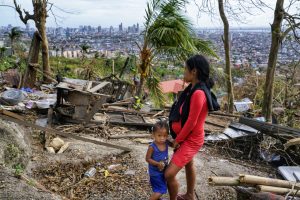The year 2021 ended tragically for the Philippines as Typhoon Rai (known locally as Odette) battered the southern part of the country, including prime tourism destinations. Recovery had barely begun when the Omicron variant once again plunged the country into panic, in addition to triggering a new set of mobility restrictions. The year 2022 is shaping up to be a tougher year, but many Filipinos are pinning their hopes on the changes that the upcoming presidential election will bring.
The election, scheduled for May 9, will give the country a new president, vice president, 12 senators, and a new term for local officials. President Rodrigo Duterte’s term will end in June and he will have no anointed successor since the candidate of his party has already backed out of the race.
The campaign period is supposed to start in February although the Omicron surge has made this uncertain. Some are even petitioning for the election to be postponed or canceled. This is unlikely to happen, but the scope of election activities is expected to be narrowed down. This will affect the interaction of candidates and voters, which could benefit incumbent officials since they have the authority to move freely even if the election campaign has yet to start.
The Commission on Elections (Comelec) will decide on various petitions, but its most important case is whether to allow former Senator Ferdinand “Bongbong” Marcos, the son and namesake of the late dictator Ferdinand Marcos, to run for president despite being a convicted tax evader. Marcos is leading in most pre-election surveys, but Comelec can still disqualify him and cancel his candidacy.
Because of Bongbong’s candidacy, the Marcos legacy will be intensely debated this year. Marcos will have the opportunity to defend his father, who ruled the country for two decades by imposing Martial Law in the 1970s. He should not be complacent with his high survey numbers, because aside from rivals who will engage him throughout the election period, pro-democracy forces that challenged the dictatorship will be also actively campaigning against him.
More than the Marcos issue, the pandemic will loom large in the minds of most voters. There is a general frustration over the Duterte government’s pandemic response, which has been characterized by an overreliance on prolonged militarized lockdowns. It does not help that an ongoing Senate probe is determining the culpability of Duterte officials in the signing of anomalous health supply contracts. It will not be difficult for critics to connect the corruption scandal with the medicine shortage being experienced in various urban centers. The recent declaration of several vaccine mandates could also potentially fuel street and community protests.
But public outrage is not just directed against the new restrictions but also the failure to distribute adequate relief and assistance to displaced workers and small entrepreneurs. There is a growing number of people who have expressed exasperation over the impact of urban shutdowns imposed due to COVID-19. They are joined by education stakeholders who are reeling from one of the world’s longest school closures. The Omicron variant has further delayed the reopening of schools, which means an extension of the suffering of students and educators who are enduring unreliable internet connections for distance learning classes.
In the provinces devastated by Typhoon Rai, local residents are struggling hard to rehabilitate their communities, in addition to facing the Omicron surge. One month has passed since the deadly flooding but several towns are still without water and electricity. Thousands are still in makeshift evacuation centers.
Even if Duterte has no official candidate for president, the coming election will offer a judgement vote for his presidency. His daughter is running for vice president and his party has fielded senatorial candidates. Duterte needs to address the issues mentioned above or else risk losing public support as dissatisfaction spreads in communities hit by surging infections, hunger, and poverty levels.
The Duterte government is probably ready to roll out new programs aimed at getting the nod of voters ahead of Election Day. But public anger could manifest itself not just in polling centers but also in the streets and other civic spaces, where “people power” has led to the toppling of governments in the past.

































